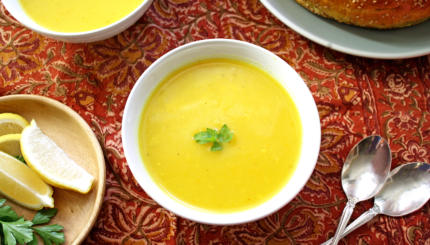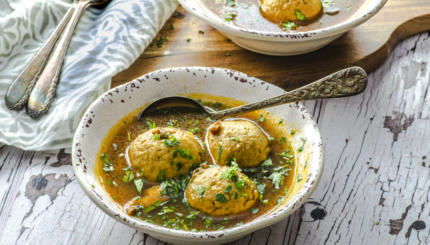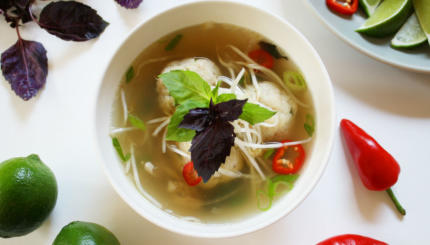I have often joked that I am the only woman in America who doesn’t cook anything that she grew up eating. Now this is not a reflection on my mother’s cooking abilities, but rather a result of my marriage to a Moroccan Israeli with very different ideas of what constitutes good food.
My husband was born in Marrakech and moved as an infant to Beersheva, Israel where much of his family still reside. There amidst the trials and tribulations of raising a family in the “ma’aborot” or tent cities, my heroic mother-in-law cared for her large family. Her main occupation in life was clearly feeding her family and in their home this meant the daily preparation of good Moroccan food translating into hours of daily cooking each day.
The food and spices she used were completely different than those that constituted my Ashkenazic upbringing. Couscous was a staple and always made properly (no instant Osem for her) and could be combined with vegetables with chicken on the side for a meat meal or could be made dairy and eaten with
leben
, a yogurt-like cheese quite popular in Israel.
would include Moroccan fish and would always feature the Moroccan version of cholent called skhina (meaning “hot in Arabic) or hamin (like the Hebrew word for hot, “cham”) which would include foods like eggs in their shells and chickpeas. Other popular dishes were chicken with olives and different vegetable soups including chickpea pumpkin soup, traditionally served on Rosh Hashanah and my son’s favorite.
Moroccan cooks are also famous for their many salads which make their appearance primarily on Friday nights (carrot, beets, anise, pepper, eggplant etc). My mother in law was also busy pickling olives, peppers and carrots.
Of course one cannot discuss Moroccan food without emphasizing the spices. Onion powder and garlic powder, perhaps the staples of Ashkenazic cooking, have no place here. Instead saffron, cumin, turmeric, cinnamon, paprika and allspice rule. Moroccan cooks also create their own blended spice called “mashia” which is great on ground beef. Lemons and olive oil are also staples with preserved lemons often used to flavor various dishes.
Then there are the exquisite foods made for special occasions which I won’t go into here since they merit their own blog post!
I often kid that my husband will only eat food if it is from somewhere between Spain and Iraq (excluding Eastern Europe of course!). Having grown up eating exclusively Moroccan and some Israeli/Middle Eastern food at home, he is not interested in anything else. In fact, when we first started dating he wouldn’t eat anything at my parent’s home not due to any concerns, but just because everything was so foreign to him. Eventually he tried my mother’s chicken soup, but he prides himself on never having tasted a matzah ball nor gefilte fish.
The fact is that I have never made these foods. Honestly, I prefer my adopted Moroccan and Middle Eastern cuisine. My “mixed” kids get their fix at their grandparent’s home if they need it. Otherwise, we are all happy embracing our Moroccan heritage.
Moroccan Chickpea/Pumpkin Soup
Ingredients
1 ¼ cups yellow split peas or chickpeas (if using chickpeas, soak for at least ½ hour)
1 large onion, chopped
2 ¾ quarts chicken stock (you can use Osem chicken mix as an option)
Salt and pepper
4 tablespoons sunflower oil (I normally use canola)
1 teaspoon cinnamon
¼ teaspoon ginger
¼ teaspoon saffron
1 pound orange pumpkin, cubed (I use calabazzo pumpkin or a butternut squash will work. I usually use about 2 pounds though the original recipe suggests 1 pound)
3 tablespoons finely chopped flat-leafed parsley
Directions
Put the yellow split peas and the onion in a pot with the stock.
Bring to a boil and simmer for at least a ½ hour or until the split peas are tender.
Add salt and pepper to taste, the oil, cinnamon, ginger and saffron and put in the pumpkin.
Simmer until the pumpkin falls apart
Use an immersion blender or a masher to make the soup smoother.
Sprinkle with flat-leafed parsley before serving.
*note that when using chicken powder I omit the salt. Also the soup can get very thick so feel free to add water to it if it feels too thick.
Ingredients
2 lbs carrots
2 garlic cloves
2 lemons
1 tablespoon cumin
2 tablespoons paprika
¼ teaspoon salt
3 tablespoons olive oil
Flat leaf parsley or coriander
Peel and clean carrots.
Directions
Peel and clean carrots.
Boil carrots until a fork easily pierces the thickest carrot.
Rinse carrots with cold water and then slice them about ¼ to ½ inch thick.
Crush or finely chop the garlic.
Mix the garlic with the juice of two lemons, all the spices and the olive oil.
Toss the carrots with the mixture.
Sprinkle chopped coriander of flat leaf parsley on the top of the carrots and toss.
Like this post? Join the conversation through MyJewishLearning’s weekly blogs newsletter.



